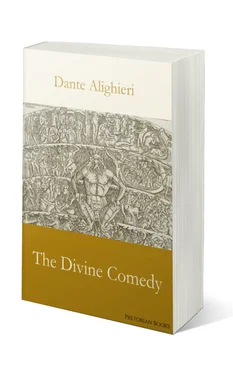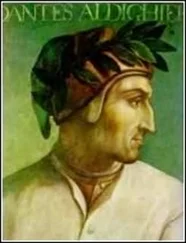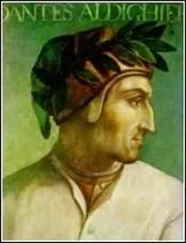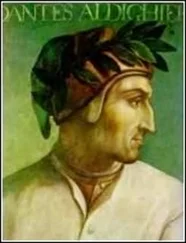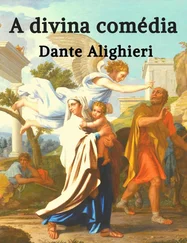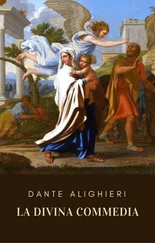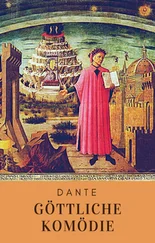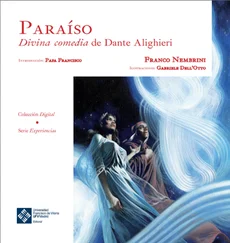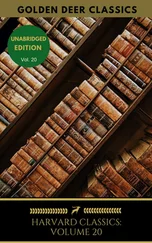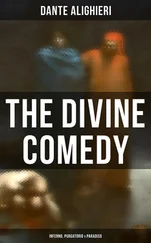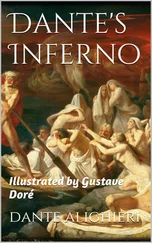Is none, nor e'en of milder pang. As cranes,
Chanting their dol'rous notes, traverse the sky,
Stretch'd out in long array: so I beheld
Spirits, who came loud wailing, hurried on
By their dire doom. Then I: "Instructor! who
Are these, by the black air so scourg'd?"—"The first
'Mong those, of whom thou question'st," he replied,
"O'er many tongues was empress. She in vice
Of luxury was so shameless, that she made
Liking be lawful by promulg'd decree,
To clear the blame she had herself incurr'd.
This is Semiramis, of whom 'tis writ,
That she succeeded Ninus her espous'd;
And held the land, which now the Soldan rules.
The next in amorous fury slew herself,
And to Sicheus' ashes broke her faith:
Then follows Cleopatra, lustful queen."
There mark'd I Helen, for whose sake so long
The time was fraught with evil; there the great
Achilles, who with love fought to the end.
Paris I saw, and Tristan; and beside
A thousand more he show'd me, and by name
Pointed them out, whom love bereav'd of life.
When I had heard my sage instructor name
Those dames and knights of antique days, o'erpower'd
By pity, well-nigh in amaze my mind
Was lost; and I began: "Bard! willingly
I would address those two together coming,
Which seem so light before the wind." He thus:
"Note thou, when nearer they to us approach.
"Then by that love which carries them along,
Entreat; and they will come." Soon as the wind
Sway'd them toward us, I thus fram'd my speech:
"O wearied spirits! come, and hold discourse
With us, if by none else restrain'd." As doves
By fond desire invited, on wide wings
And firm, to their sweet nest returning home,
Cleave the air, wafted by their will along;
Thus issu'd from that troop, where Dido ranks,
They through the ill air speeding; with such force
My cry prevail'd by strong affection urg'd.
"O gracious creature and benign! who go'st
Visiting, through this element obscure,
Us, who the world with bloody stain imbru'd;
If for a friend the King of all we own'd,
Our pray'r to him should for thy peace arise,
Since thou hast pity on our evil plight.
Of whatsoe'er to hear or to discourse
It pleases thee, that will we hear, of that
Freely with thee discourse, while e'er the wind,
As now, is mute. The land, that gave me birth,
Is situate on the coast, where Po descends
To rest in ocean with his sequent streams.
"Love, that in gentle heart is quickly learnt,
Entangled him by that fair form, from me
Ta'en in such cruel sort, as grieves me still:
Love, that denial takes from none belov'd,
Caught me with pleasing him so passing well,
That, as thou see'st, he yet deserts me not.
"Love brought us to one death: Caina waits
The soul, who spilt our life." Such were their words;
At hearing which downward I bent my looks,
And held them there so long, that the bard cried:
"What art thou pond'ring?" I in answer thus:
"Alas! by what sweet thoughts, what fond desire
Must they at length to that ill pass have reach'd!"
Then turning, I to them my speech address'd.
And thus began: "Francesca! your sad fate
Even to tears my grief and pity moves.
But tell me; in the time of your sweet sighs,
By what, and how love granted, that ye knew
Your yet uncertain wishes?" She replied:
"No greater grief than to remember days
Of joy, when mis'ry is at hand! That kens
Thy learn'd instructor. Yet so eagerly
If thou art bent to know the primal root,
From whence our love gat being, I will do,
As one, who weeps and tells his tale. One day
For our delight we read of Lancelot,
How him love thrall'd. Alone we were, and no
Suspicion near us. Ofttimes by that reading
Our eyes were drawn together, and the hue
Fled from our alter'd cheek. But at one point
Alone we fell. When of that smile we read,
The wished smile, rapturously kiss'd
By one so deep in love, then he, who ne'er
From me shall separate, at once my lips
All trembling kiss'd. The book and writer both
Were love's purveyors. In its leaves that day
We read no more." While thus one spirit spake,
The other wail'd so sorely, that heartstruck
I through compassion fainting, seem'd not far
From death, and like a corpse fell to the ground.
MY sense reviving, that erewhile had droop'd
With pity for the kindred shades, whence grief
O'ercame me wholly, straight around I see
New torments, new tormented souls, which way
Soe'er I move, or turn, or bend my sight.
In the third circle I arrive, of show'rs
Ceaseless, accursed, heavy, and cold, unchang'd
For ever, both in kind and in degree.
Large hail, discolour'd water, sleety flaw
Through the dun midnight air stream'd down amain:
Stank all the land whereon that tempest fell.
Cerberus, cruel monster, fierce and strange,
Through his wide threefold throat barks as a dog
Over the multitude immers'd beneath.
His eyes glare crimson, black his unctuous beard,
His belly large, and claw'd the hands, with which
He tears the spirits, flays them, and their limbs
Piecemeal disparts. Howling there spread, as curs,
Under the rainy deluge, with one side
The other screening, oft they roll them round,
A wretched, godless crew. When that great worm
Descried us, savage Cerberus, he op'd
His jaws, and the fangs show'd us; not a limb
Of him but trembled. Then my guide, his palms
Expanding on the ground, thence filled with earth
Rais'd them, and cast it in his ravenous maw.
E'en as a dog, that yelling bays for food
His keeper, when the morsel comes, lets fall
His fury, bent alone with eager haste
To swallow it; so dropp'd the loathsome cheeks
Of demon Cerberus, who thund'ring stuns
The spirits, that they for deafness wish in vain.
We, o'er the shades thrown prostrate by the brunt
Of the heavy tempest passing, set our feet
Upon their emptiness, that substance seem'd.
They all along the earth extended lay
Save one, that sudden rais'd himself to sit,
Soon as that way he saw us pass. "O thou!"
He cried, "who through the infernal shades art led,
Own, if again thou know'st me. Thou wast fram'd
Or ere my frame was broken." I replied:
"The anguish thou endur'st perchance so takes
Thy form from my remembrance, that it seems
As if I saw thee never. But inform
Me who thou art, that in a place so sad
Art set, and in such torment, that although
Other be greater, more disgustful none
Can be imagin'd." He in answer thus:
"Thy city heap'd with envy to the brim,
Ay that the measure overflows its bounds,
Held me in brighter days. Ye citizens
Were wont to name me Ciacco. For the sin
Of glutt'ny, damned vice, beneath this rain,
E'en as thou see'st, I with fatigue am worn;
Nor I sole spirit in this woe: all these
Have by like crime incurr'd like punishment."
No more he said, and I my speech resum'd:
"Ciacco! thy dire affliction grieves me much,
Even to tears. But tell me, if thou know'st,
What shall at length befall the citizens
Of the divided city; whether any just one
Inhabit there: and tell me of the cause,
Whence jarring discord hath assail'd it thus?"
He then: "After long striving they will come
To blood; and the wild party from the woods
Will chase the other with much injury forth.
Then it behoves, that this must fall, within
Читать дальше
